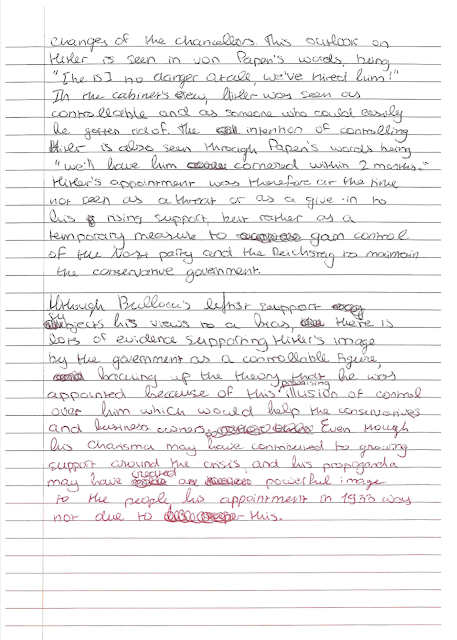The rise of Adolf Hitler to the seat of power in Germany is a complex interplay of socio-economic conditions, political manoeuvres, and individual charisma. The aftermath of the First World War left Germany in a state of national humiliation and economic despair, a fertile ground for Hitler's nationalistic and anti-Semitic ideologies. This essay will explore the factors that contributed to Hitler's ascent to dictatorship, the strategies he employed, and the reasons why German society allowed this to happen.
The economic despair and social discontent post-World War I significantly contributed to Hitler's rise. The Treaty of Versailles that concluded the war in 1918 was harsh on Germany, imposing immense war reparations and territorial losses. The Weimar Republic, the democratic government that replaced the Kaiser in 1919, was viewed as the architects of this humiliation. Historian Ian Kershaw argues that the 'stab-in-the-back' myth, blaming the republic for the nation's humiliation, provided a unifying narrative for Hitler's rise. The Great Depression, which began in 1929, compounded the economic despair. Mass unemployment, poverty, and hyperinflation created a sense of hopelessness amongst the German populace.
Parallel to these socio-economic conditions, Hitler, with his persuasive oratory skills, was able to tap into the public's resentment towards the Weimar Republic. He painted himself as a saviour, promising to restore German honour and economic prosperity. His fiery speeches tapped into the deep-seated fears and prejudices of the Germans, and his powerful rhetoric promised solutions. The Nazi party, under Hitler's leadership, used propaganda to disseminate their ideology effectively. Joseph Goebbels, the Reich Minister of Propaganda, played a significant role in creating a cult personality around Hitler, reinforcing his image as Germany's saviour.
The failure of the Weimar Republic's democratic institutions, coupled with political manoeuvring, paved the way for Hitler's ascent to power. Historian Richard Evans argues that the republic was doomed from the start, as it was born out of defeat and associated with shame and weakness. In the 1932 elections, the Nazi party became the largest in the Reichstag. However, Hitler did not come to power through a democratic process. In a power play involving prominent politicians such as President Paul von Hindenburg and Chancellor Franz von Papen, Hitler was appointed as Chancellor in January 1933. This marked the beginning of Hitler's transformation from a democrThe 'Reichstag Fire' in February 1933, and the subsequent 'Enabling Act', were pivotal moments in Hitler's consolidation of power. The fire, which Hitler blamed on the communists, gave him an excuse to declare a state of emergency, effectively suspending civil liberties and habeas corpus rights. The Enabling Act, passed a month later, granted Hitler the power to enact laws without the involvement of the Reichstag, essentially turning the Weimar Republic into a legal dictatorship. Historian Detlev Peukert emphasises the role of these events as critical in Hitler's transformation into a dictator. The final stage in Hitler's ascent was the process of 'Gleichschaltung', a series of legislative acts and purges that systematically eradicated all opposition and centralised power in Hitler. The Night of the Long Knives in 1934, where key leaders of the SA (Sturmabteilung) were purged, was one such step. The death of President Hindenburg in August 1934 led to the merging of the Presidency and the Chancellorship into a single position, the 'Führer', with Hitler assuming this new role. This was a significant turning point in Hitler's consolidation of power. Historian Joachim Fest argues that Hitler's successful consolidation of power was largely due to his manipulative political strategy, combined with his ruthless, autocratic tendencies.atic leader to a dictator.
In conclusion, Hitler's rise to dictatorship was a complex process facilitated by socio-economic turmoil, strategic political manoeuvring, and his charismatic leadership. The failure of the Weimar Republic, coupled with economic instability and national humiliation, created an environment ripe for Hitler's rise. Hitler skillfully exploited the public's discontent, presenting himself as a saviour who would restore Germany's honour and prosperity. Critical events like the Reichstag Fire and the Enabling Act, coupled with systematic Gleichschaltung, sealed Hitler's authoritarian rule. The narrative of Hitler's rise is not simply a tale of a charismatic leader ascending to power, but a sobering reflection of how societal discontent, political machinations, and economic instability can converge, leading to the rise of a dictator. It is a historical event with a profound lesson for subsequent generations about the fragility of democratic institutions and the potential for their manipulation by autocratic forces.












